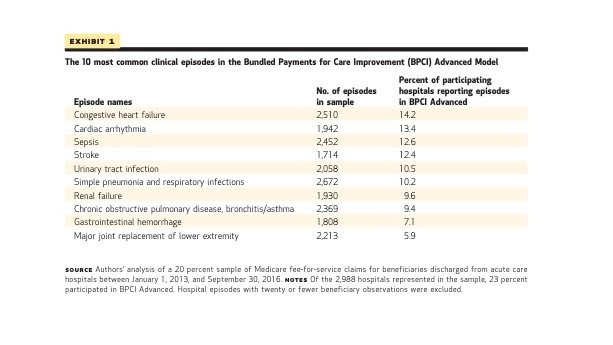
We dove into how financial incentives affect hospital participation in BPCI-Advanced and what this means for CMS.
Hospitals with higher spending targets are:
1. More likely to participate
2. More likely to gain shared savings from mean reversion
bit.ly/32bVrKd
Hospitals with higher spending targets are:
1. More likely to participate
2. More likely to gain shared savings from mean reversion
bit.ly/32bVrKd

This is important because the vast majority of alternative payment models are VOLUNTARY.
Thus, burden falls on CMS to design incentives that encourage participation while achieving meaningful reductions in spending.
Key articles on this topic below:
Thus, burden falls on CMS to design incentives that encourage participation while achieving meaningful reductions in spending.
Key articles on this topic below:

In BPCI-A, target prices are the financial yardstick.
Hospitals gain/lose revenue based on their spending relative to target prices.
Interviews with hospitals from the initial BPCI-A eval suggest that they closely evaluate target prices when deciding whether to participate.
Hospitals gain/lose revenue based on their spending relative to target prices.
Interviews with hospitals from the initial BPCI-A eval suggest that they closely evaluate target prices when deciding whether to participate.

Using Medicare claims, we estimated target prices for all 29 inpatient conditions and assessed association with participation.
10 most common episodes in sample here:
10 most common episodes in sample here:

Hospitals that receive higher target prices are more likely to participate.
We estimate that each $1,000 increase in target prices increased the probability of participation by 0.78 percentage points across all episodes.
We estimate that each $1,000 increase in target prices increased the probability of participation by 0.78 percentage points across all episodes.

At first, that might seem like a good thing and perhaps it is!
These hospitals may have more unnecessary spending, overuse of post-acute care, preventable readmissions, etc.
These hospitals may have more unnecessary spending, overuse of post-acute care, preventable readmissions, etc.
But these hospitals are also more likely to have natural decreases in spending from mean reversion.
Mean reversion is the tendency for observations to move closer to the mean over time.
This has complicated other programs (eg. HRRP) and, more recently, healthcare “hotspotting”.
Mean reversion is the tendency for observations to move closer to the mean over time.
This has complicated other programs (eg. HRRP) and, more recently, healthcare “hotspotting”.

In our example, we found that hospitals with higher spending would be expected to move closer to the mean of all hospitals over time.
Hospitals with spending that was 10% higher than target prices at baseline could expect spending to decline by 7.4% in the performance period from mean reversion.
Hospitals with spending that was 20% higher than target prices could expect a decline of 9.8%.
#statstwitter
Hospitals with spending that was 20% higher than target prices could expect a decline of 9.8%.
#statstwitter

Policy Implication #1
CMS should consider redesigning BPCI-A target prices to combat the effects of mean reversion (think: bayesian shrinkage).
CMS should consider redesigning BPCI-A target prices to combat the effects of mean reversion (think: bayesian shrinkage).
Policy Implication #2
Alternatively, making hospital participation in BPCI-A mandatory, perhaps through random assignment, would result in a more balanced sample of high- and low-spending hospitals and reduce CMS losses from mean reversion.
Alternatively, making hospital participation in BPCI-A mandatory, perhaps through random assignment, would result in a more balanced sample of high- and low-spending hospitals and reduce CMS losses from mean reversion.
Thank you to PI @Andy_Ryan_dydx and the entire @UM_CEHR @UM_IHPI team -- this project was a team effort every step of the way! #dreamteam #mentortothemax #sponsorship
Here is a link to the @UM_IHPI press release:
ihpi.umich.edu/news/hospitals…
Here is a link to the @UM_IHPI press release:
ihpi.umich.edu/news/hospitals…
• • •
Missing some Tweet in this thread? You can try to
force a refresh



